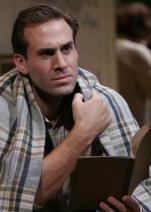SEARCH
REVIEWS
FEATURES
NEWS
Etcetera and
Short Term Listings
LISTINGS
Broadway
Off-Broadway
BOOKS and CDs
OTHER PLACES
Berkshires
London
LA/San Diego
Philadelphia
Elsewhere
QUOTES
On TKTS
LETTERS TO EDITOR
FILM
LINKS
MISCELLANEOUS
Free Updates
Masthead
Writing for us
A CurtainUp  London Review
London Review
 London Review
London ReviewEpitaph for George Dillon
|
Mrs ElliottSurely he could do a job of work?
Ruth: Job of Work? (beat) He's a writer! |

Joseph Fienees as George Dillon
(Photo: Nobby Clark) |
Now Joseph Fiennes arrives in what is his first outing on the West End stage for several years to play alongside his brother's Ralph's partner, Francesca Annis. In one of those history repeating itself things, the Royal Court production of Epitaph for George Dillon transferred to the Comedy Theatre, where it is now playing almost 50 years later.
Epitaph for George Dillon is set in Britain just after the Second World War in house of mainly women. Anne Reid plays Mrs Elliot, a homely woman who has lost her only son in the war. Geoffrey Hutchins is her self-effacing husband. Also in the house us her youngest daughter Josie (ZoŽ Tapper), frumpy Norah (Dorothy Atkinson) and her sister sophisticate Ruth Gray (Francesca Annis). At work, Mrs Elliot is charmed by a young clerk, George Dillon (Joseph Fiennes), who, at her invitation, moves into the house. George is unemployed but talks of getting work as a writer or actor. He is charming and seductive but feckless and happy to sponge off the doting Elliots.
There are a lot of themes here that were prevalent in the 1950s, the decade between the Second World War and the splendid 1960s. The first few years after the war were ones of rationing and austerity but the economy quickly turned around and in 1957 the British Prime minister Harold Macmillan was declaring to the population, "You've never had it so good!". Hanging over the play is the loss of the Elliot boy, a loss which allows George to establish himself in the son's place.
George's lack of direction and verve, his lack of commitment is an early inkling of Osborne's later "angry young man", Jimmy Porter.
All Osborne's characters shoulder a sense of disappointment, of anti-climax, that peace time ought to be so much better. Francesca Annis' Ruth is an elegant and attractive woman who cannot settle for or compromise for the tedious existence of her sister, but instead finds herself cynical and disappointed. It is only with Ruth that George drops the pretence and reveals the extent of his own cynicism. Together they are two lost souls.
It is a pleasure to see Joseph Fiennes back on stage but somehow the part seems not to fit him well. I cannot quite put my finger on what didn't take off for me but maybe the writing is not the most dynamic. There is however the most wonderful final speech from George as he plays out his life and gives the play its title, but it is a long time to wait for this moment. The beautiful Francesca Annis is of course delightful as the fashionable and unhappy Ruth, her dark eyes full of passion and pain. Anne Reid excels as one of these aproned women who work hard and care for their families with little reward other than virtue itself.
The box set is ideal at recreating a 1950s house with attention to detail, yet avoiding clichť. The room is dominated by the ghastly cloudscape painting by the dead son. We can see the stairs and the front door and the door to the kitchen, all giving a sense of the claustrophobia of living at such close quarters. Peter Gill is an expert at directing this type of play but despite all the accurate echoes of the 1950s, the play itself fails to involve us in its outcomes.
|
EPITAPH FOR GEORGE DILLON
Written by John Osborne and Anthony Creighton Directed by Peter Gill Starring: Joseph Fiennes, Francesca Annis With: Anne Reid, Geoffrey Hutchings, Hugh Simon, ZoŽ Tapper, Dorothy Atkinson, Alex Dunbar, Stephen Greif Design: John Gunter Lighting: Hugh Vanstone Music compiled by David Shrubsole Running time: Two hours 35 minutes including one interval Box Office: 0870 060 6637 Booking at the Comedy Theatre to 14th January 2005 Reviewed by Lizzie Loveridge based on 28th September 2005 at the Comedy Theatre, Panton Street, London SW1 (Tube: Piccadilly Circus) |





